- Home
- Sharon Shinn
The Safe-Keeper's Secret Page 3
The Safe-Keeper's Secret Read online
Page 3
“Because she was engaged to marry him, and he thought he had lost her forever.”
“I don’t think I’d have wanted her to come back if she was going to come back like that,” Fiona said.
“Fiona!” her mother and her aunt said at the same time. Her mother added, in the voice of gentle reprimand that was her harshest form of punishment, “That’s an unkind thing to say. You, with all the advantages of youth and health, should be kindest of all to someone who is weak and in pain.”
Fiona shrugged. “I’ll try,” she said, “if I ever see her again.”
Angeline shook her head a little, as if to say, What can you expect from a ten-year-old girl? “Now,” she said, more briskly. “Where’s this food I’ve been hearing about? I’m very hungry—and unlike Victoria, I can certainly eat!”
After the meal, it was time for gifts. Between them, Fiona and Reed opened box after box of treasures, including dolls and soldiers and a variety of games. They were both well pleased with the assortment. Indeed, Greg and Reed and a few of the other boys immediately set up a round of ring-toss and began running back and forth across the lawn with as much energy as they had shown at the start of the very long day.
“Doesn’t sit still too much, does he?” Thomas inquired, coming to sit by Angeline and Damiana and Fiona.
Damiana laughed. “I would say never,” she said. “He’s like a bright fire on the kitchen hearth. He burns without ceasing.”
Thomas nodded at Fiona, though she kept her eyes on her new doll and pretended he had not joined them. “And this one?”
Damiana reached out a hand to stroke Fiona’s hair. “This one is like a coal in the firepit. Cool to look at but blazing with heat within.”
Fiona could feel that the Truth-Teller was still watching her. “Come with me to the front of the house,” he said. “I have a present for you, but it needs explaining.”
The two women looked over at Fiona, for they could tell, if he could not, that she had set her mind against Thomas and might not be eager to go. But she shrugged and laid her doll aside and stood up.
“All right,” she said.
A few months ago, he would have taken her hand and led her around the house, but today he did not try. He just walked in silence beside her as they passed the garden and rounded the corner and came to rest under the still, spreading branches of the kirrenberry tree. Kirrenberry trees never grew very tall or very broad, but their flat, dark leaves were wide and dense, and if you stood beneath one on the sunniest day, you would stand in absolute shadow.
“Last time I was here,” Thomas said, running his hand down the smooth bark of the thick trunk, “your mother allowed me to trim a couple of branches and take them with me for whittling. I made two whistles, one for your brother and one for you.”
Fiona frowned a little. “I’ve never heard of anyone making a whistle from a kirrenberry tree,” she said.
“No, and I’ll show you why,” he agreed. He pulled a small flute out of a pocket in his vest. The wood was light colored and prettily marked with darker swirls and flecks the size of a bird’s eye. He had strung it on a black silk cord so she could wear it around her neck. “Here. Blow into it and make a melody if you can.”
Fiona gave him a sharp glance, then took the whistle from his hand. Putting her mouth against the blowhole and her fingers on the openings of the pipe, she breathed in.
But no sound came out.
She tried again and again, each time blowing harder, but the whistle would issue no music. “I don’t understand,” she said at last. “Why doesn’t it work? Is it broken?”
Thomas shook his head. He was still standing with his hand against the trunk of the tree, watching her with his shadowed eyes. “Because a kirrenberry tree won’t make a sound,” he said. “You can cut its branches to make two sticks that you hit together along with the beat in a reel—but they make no sound. Hit it with an ax and the tree yields up no ringing noise. Fell it in the forest, and you will not hear it toppling to the ground. A whistle makes no music. Birds who land in its branches forget their own songs.”
Now she was frowning. “That makes no sense.”
He nodded. “That’s why the kirrenberry tree is planted in front of the house of every Safe-Keeper in every village from here to the Cormeon Sea. Because a kirrenberry tree signifies silence.”
She lifted her head; now she understood the lesson. If she did not like this mute whistle, she could not be a Safe-Keeper. If she was afraid of silence, she could not learn her mother’s trade. “Thank you very much,” she said distinctly. “I will treasure my kirrenberry flute forever.”
Now he smiled at her, more amused than she had expected. “I was sure you would,” he said. “Now, I’m about ready for more of that pie—how about you?”
Chapter Two
It was going on toward midnight before the last of the birthday guests left. Greg had fallen asleep on a blanket by his grandmother’s chair, but Reed was still parading around the back lawn, his new whistle held to his mouth, producing unheard music for an invisible audience. Elminstra sighed and pushed herself to her feet.
“Well, I’m the last one here. I’d better be getting back,” she said. “Greg! Wake up, child, we have a little walk home.”
“He can sleep on the floor in the big room,” Damiana offered.
Elminstra snorted. “You’ve got a houseful already,” she said. “He can wake up long enough to stumble a quarter mile down the road. Greg! Gregory! Open your eyes!”
But Greg snored on. The women laughed. “I’ll carry him,” Thomas said, and scooped the sleeping boy into his arms. Greg never woke. “I’ll be back in a little bit,” he said to Damiana, and walked off with Elminstra into the soft dark.
Damiana stood up. “Reed! Fiona! Time for bed!”
For Fiona, this was the best part of the day. Every day.
She cleaned herself up at the sink in the kitchen, then hurried up the open stairs to her room. She was dressed in her nightclothes and under a light sheet when her mother came into the room, holding a single candle. Her mother settled on the edge of the bed and patted the covers around Fiona’s shoulders.
“All tucked in? All comfy?”
Fiona nodded, tangling her hair on the pillow. Damiana smoothed the loose curls from her forehead, her hand cool as spring rain. “So what made today special?” she asked, as she always asked.
“A lot of things, today,” Fiona said. “All the people. All the food! All the presents. Angeline.”
“Turning one year older,” her mother suggested.
“I don’t feel a whole year older,” Fiona said.
Damiana smiled. “No. You never do, on your birthday. On your birthday you feel exactly the same as you did the day before and the day before. Six months from now you’ll feel older. In two years you’ll feel older than you do right now. But it’s slow. It’s an invisible process.”
“Like summer,” Fiona said. “One day it’s just there.”
Damiana laughed. “Exactly like summer. And then, eventually, like winter. But not for a few months yet.”
“How long will Angeline stay this time?”
“Just two or three nights, I think.”
“And Thomas?”
“Maybe a week. I don’t know.”
“He made us whistles from kirrenberry branches.”
“And have you forgiven him yet?”
Fiona scowled. “I don’t have to forgive him. I don’t even have to like him.”
“No, you don’t,” her mother agreed. “Many people don’t like Truth-Tellers. But if you don’t like him, it should be for something he’s done other than tell the truth.”
“He said I wouldn’t be a Safe-Keeper!” Fiona burst out.
Damiana leaned down and kissed her on the forehead. “Ah, see, he was practicing the wrong skills when he said that,” she murmured. “He was pretending he could forecast what is to come. But his talent is for telling the truth, not telling the future.”
/> “So then he doesn’t know? I will be a Safe-Keeper after all?”
Damiana kissed her on the forehead again. “You will be whatever you want to be,” she said, as she had said that day.
“But don’t the sons and daughters of Safe-Keepers always become Safe-Keepers? Like you and Angeline did, like your mother did, like her mother did—”
“Many times they do. Not always. Think how dull it would be if you knew, from the very day you were born, what you would grow up to be. If everybody knew. You might become, instead, a farmer. Or an ale-maker. Or a farrier. Or a woman who raises rabbits in her hutch out back. You might become a Truth-Teller or—who knows?—the Dream-Maker. You might not want to be a Safe-Keeper after all.”
Fiona picked at her mother’s sleeve. “Reed can become whatever he wants,” she said. “He’s not a Safe-Keeper’s son.”
Damiana laughed. “Yes, indeed, Reed does not seem like the type to sit at home and look after other people’s secrets.”
“I used to worry,” Fiona said. “When I was little.”
“Worry about what?”
“That you wouldn’t love Reed as much as you loved me. Because he wasn’t truly your son.”
“But I do. I love you both exactly the same much,” Damiana said, laughing a little at her own choice of words.
Fiona nodded solemnly. “But I didn’t know that. I was little. I thought there was only so much love.”
“Love is like water from the ocean,” Damiana said. “You cannot empty it dry. Take bucket after bucket of water out of the Cormeon Sea, and there is still more water left than you could ever use up. That’s what love’s like.”
“And you won’t ever send him away? To Wodenderry?”
Damiana smoothed her hair away again. “Not to Wodenderry or anywhere else,” she said. “Reed will only leave here if he wants to go.”
Fiona turned to her side and snuggled deeper into the pillow. She was tired, but she wasn’t sleepy. She thought she might lie awake a long time, thinking over the events of the day. “It was a very good party,” she said.
Damiana kissed her on the ear, making her giggle. “Good night, Safe-Keeper’s daughter,” she whispered. “Sweetest dreams.”
Damiana stood and carried her candle across the hall to Reed’s room, leaving Fiona’s room in darkness. Fiona listened, as she listened every night, to her mother’s goodnight interlude with Reed. They talked over the party (his favorite part of the day was playing ring-toss with Greg) and discussed which of his toys he might play with first in the morning. Finally, Damiana said, “Time to sleep, Safe-Keeper’s son.”
“I’m not sleepy,” he said, as he said every night.
There was a moment’s silence; Fiona knew her mother had leaned in to press her lips against Reed’s cheek and forehead. “You’re sleepy now,” Damiana murmured. “I’m giving you magical sleeping kisses, all over your face.”
“But I’m really not tired,” he insisted.
“Ah! Another magical sleeping kiss.”
“Can I come down and sit with you and Thomas and Angeline? If I can’t fall asleep?”
“Lie here a while, and if you can’t fall asleep in twenty minutes, then you can come downstairs and have a cup of tea. But you’ll be sleepy because—here’s one more!—I’ve given you all these magical sleeping kisses. Good night, Reed.”
“Good night,” he answered through a yawn.
He was, as he always was, asleep before Damiana was through the door.
Fiona listened to the sounds of her mother’s footsteps going carefully down the stairway, and then to the sounds of talk and laughter that floated up during the next half hour. She closed her eyes and willed sleep to come, but it would not. Her mind was too busy showing her images from the day: Elminstra’s laughing face, Thomas’ haunted eyes, the sickly Victoria leaning back on the hard cushions of the traveling wagon. After a while she gave up and pushed back the covers. Moving as quietly as she could, she crept out of her bed and halfway down the stairs, perching on the small landing just where the stairwell curved, so that she would stay out of sight.
The big room below was filled with not only the noise of conversation but the scents of coffee and brandy and tobacco. Fiona could always tell when Thomas had come for a visit; he carried aromas that none of the women of the village brought inside. He was here often enough—every few months—and would usually stay a few days. Damiana, always serene and cheerful, was even more cheerful whenever he came in for a visit.
He was the one talking just now.
“Oh, yes, I was in Thrush Hollow two weeks ago,” he said, his voice slow and sardonic. “Called there by the village busybody—and a committee of her friends—who wanted me to tell her neighbor what a filthy pig he was.”
“And was he?” Angeline inquired.
“Worst sty I ever saw, that a man called a house and not a cow barn,” Thomas said roundly. “Must have had fifteen dogs, all of them living in the house, as well as a handful of wild boys who seemed as likely to throw their garbage on the floor as take it out back and burn it. More likely, actually. You never smelled such a stench. And don’t even ask me what the yard and garden looked like. Well, they’d been hobbling their horses inside the front gate at night, so you can guess for yourselves.”
“So you told him he lived like an animal,” Angeline prodded.
“Told him he was a disgrace to his family, as well as a hazard to general health, and that his sons needed schooling and his animals needed training and that his neighbors had decided, rightly, to send in a delegation to clean out his place.”
“How did he respond?”
“At first he blustered, then he broke down, talked about his wife dying two years ago and how everything had slipped out of his hands. So I told him to welcome his neighbors’ delegation and ask for their help, and maybe life would get better—and cleaner—from now on.”
“But that wasn’t the end of it, I’ll wager,” Damiana said in a soft voice.
He laughed. “No. Then I told the busybody neighbor lady that she fancied herself a righteous woman, but there wasn’t a bone of human kindness in her, since she did nothing to aid a man so desperately in pain. And I told one of her committee friends that her husband was not, in fact, dead, but living over in Merendon with another woman. I didn’t go looking for these truths just to be unpleasant, mind you, but they were there, apparent, and I was compelled to speak them.”
Fiona could hear the smile in her mother’s voice. “Never call a Truth-Teller to your house unless you are not afraid of the truth. For he sees things you would wish never to be discovered.”
“There’s a truth that came out down by Marring Cross just a week or so ago,” Thomas said.
Marring Cross was only a few miles from Angeline’s home of Lowford. “Really?” asked Angeline. “What was it?”
“Gold buried in the cleric’s back yard. Enough of it to send his two young sons on their way in the world.”
Fiona felt her eyes widen. Clerics were not supposed to marry and certainly should not have children. But Angeline’s voice did not sound surprised when she answered. “Oh. Yes. They’re half-brothers, aren’t they, those boys?”
“Yes. Ten and twelve. Three people keeping those secrets, though it seems each woman was surprised as the other to find she was not the only love of this man’s life.”
“How did you know?” Fiona heard her mother ask.
“How did I know what?” Thomas replied.
“How did you know it was time to reveal this particular secret? Why did it become the province of the Truth-Teller and no longer the property of the Safe-Keeper of Marring Cross?”
“Actually, she didn’t know,” Angeline said. “But I did.”
“But then—did you let go?” Thomas asked. “Because suddenly, one day, the knowledge was just in my head. I wandered down to Marring Cross and advised the town council to begin digging.”
“It’s strange,” Angeline said. “You would think, b
eing a Safe-Keeper, I would know the answer to that. Some secrets last only until the person who has told them is dead. Some secrets last until the Safe-Keeper knows it is time to repeat them. Some secrets are never revealed.”
“Who killed Anya Haber?” Damiana murmured.
“Exactly!” Angeline exclaimed. “No one has ever answered that question, and I’m sure the Safe-Keeper of Thrush Hollow knew the answer before she died. But it was a secret that was meant to be kept.”
“I have secrets that should die with me,” Damiana said. “But will they? That’s what I want to know. How can I make sure they don’t get freed somehow after I’m gone?”
“I think the secret knows,” Thomas said. “When to be a secret and when to be a truth. We’re just the instruments that hear the words and keep them—or speak them.”
Angeline yawned. “Well, here’s a secret. I’m exhausted. I’m going to bed and sleeping for a hundred hours.”
Damiana sounded amused. “Not with my children in the house. You’ll be awake at dawn.”
“Then I’d better start sleeping now.”
There was the sound of chairs scraping back and dishes being gathered up. Fiona scurried back up the stairs before anyone could spot her and returned to her bed. Now she was yawning; the illicit little excursion had finally tired her out. She closed her eyes and slept.
Reed crept into her room early in the morning. “Fiona! Are you awake? Are you awake? Fiona!”
“What?” she grumbled, turning over to look at him. It was hard to remember a morning in her life that had not begun with Reed interrupting her dreaming.
“Get dressed. Come out and play,” he commanded.
“I don’t like ring-toss,” she said with a pout.
“Not ring-toss, then! We can play war with my new soldiers. Or build my new kite. Or run down to the spring and catch fish.”
“We never catch fish.”
“But we will today! Or we can go down to Elminstra’s and see if Greg can come out. Or we can—”
She wanted to cover her head with the pillow, but it would do no good. Reed would keep inventing alternatives until he hit upon one she liked or she wearied of telling him no. So she climbed out of bed and put on her clothes and tied her hair back in a sloppy braid. A quick, quiet trip to the kitchen, and they were on their way before anyone else in the house was astir.

 Jenna Starborn
Jenna Starborn Troubled Waters
Troubled Waters The Thirteenth House
The Thirteenth House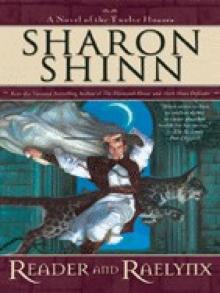 Reader and Raelynx
Reader and Raelynx Angel-Seeker
Angel-Seeker Archangel
Archangel Jeweled Fire
Jeweled Fire Nocturne
Nocturne The Shape-Changer's Wife
The Shape-Changer's Wife Still Life With Shape-Shifter
Still Life With Shape-Shifter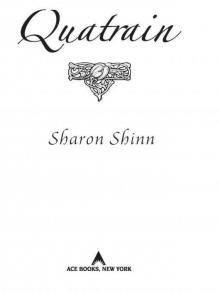 Quatrain
Quatrain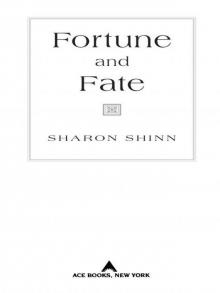 Fortune and Fate
Fortune and Fate Angelica
Angelica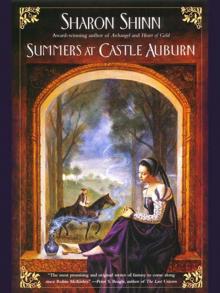 Summers at Castle Auburn
Summers at Castle Auburn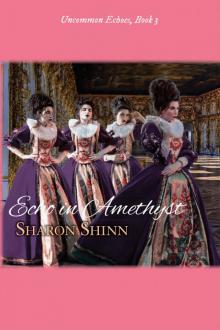 Echo in Amethyst
Echo in Amethyst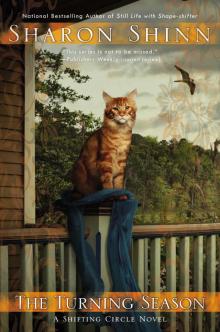 The Turning Season
The Turning Season Mystic and Rider
Mystic and Rider Heart of Gold
Heart of Gold The Shape of Desire
The Shape of Desire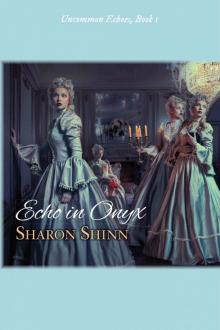 Echo in Onyx
Echo in Onyx Royal Airs
Royal Airs Gateway
Gateway The Safe-Keeper's Secret
The Safe-Keeper's Secret Wrapt in Crystal
Wrapt in Crystal Unquiet Land
Unquiet Land Jovah's Angel
Jovah's Angel Dark Moon Defender (Twelve Houses)
Dark Moon Defender (Twelve Houses) Mystic and Rider (Twelve Houses)
Mystic and Rider (Twelve Houses)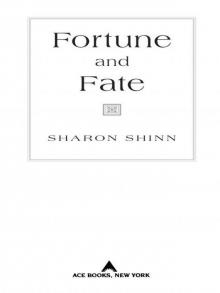 Fortune and Fate (Twelve Houses)
Fortune and Fate (Twelve Houses)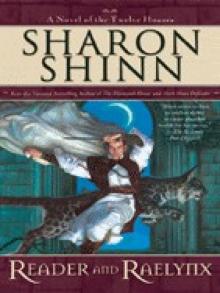 Reader and Raelynx (Twelve Houses)
Reader and Raelynx (Twelve Houses)